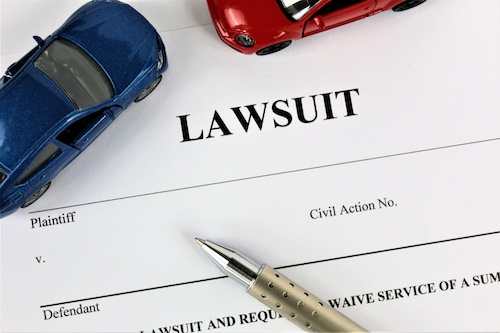How Long After an Accident Can You Sue for Personal Injury in Georgia?
At Atlanta Metro Law, we are dedicated to providing expert legal representation to individuals who have been injured in car accidents. Our team of experienced car accident lawyers understands the challenges you face after an accident and is committed to helping you navigate the legal process with confidence. We prioritize clear communication, aggressive advocacy, and securing the maximum compensation you deserve. Trust us to handle the legal complexities while you focus on your recovery.
If you’ve been involved in a car accident in Georgia, understanding the legal process is crucial to ensuring you receive the compensation you deserve. One key factor to keep in mind is the statute of limitations—the time limit within which you must file a personal injury lawsuit. Missing this deadline can prevent you from pursuing legal action and seeking compensation for medical expenses, lost wages, and other damages.
In this blog, we will explain how long you have to file a personal injury lawsuit in Georgia, the steps to pursue compensation, and why working with an experienced Atlanta car accident lawyer is crucial for protecting your rights and securing fair compensation.
Understanding the Statute of Limitations for Personal Injury Lawsuits in Georgia
The statute of limitations sets a time limit for filing a personal injury lawsuit. In Georgia, it is important to understand this timeframe to ensure your right to seek compensation is protected.
What is the Statute of Limitations?
The statute of limitations is a law that determines how long an individual has to file a legal claim after an accident. For personal injury cases in Georgia, this law sets a deadline by which you must file a lawsuit. If you fail to file within this time frame, the court may dismiss your case.
Statute of Limitations for Personal Injury Cases in Georgia
Under O.C.G.A. § 9-3-33, the statute of limitations for most personal injury lawsuits in Georgia is two years. This means that you must file your personal injury lawsuit within two years of the date of the accident. After this period, the right to pursue compensation may expire.
Exceptions to the Two-Year Rule
There are some exceptions that could extend or shorten the statute of limitations period. For example, the discovery rule may apply if you only discover your injury after the accident. In such cases, the two-year period starts from the date you learned or should have learned about the injury.
Wrongful Death Claims
For wrongful death lawsuits in Georgia, the statute of limitations is also two years from the date of death (O.C.G.A. § 51-4-2). This law allows family members to file a claim on behalf of the deceased to seek compensation for their loss.
Impact of Missing the Deadline
If you miss the statute of limitations deadline, you may lose the opportunity to file a personal injury lawsuit. This makes it crucial to act quickly after an accident and consult with an experienced personal injury attorney to protect your legal rights.
What Happens If You Miss the Deadline?
Missing the statute of limitations deadline can have serious consequences for your personal injury case. It is important to understand what happens if you fail to file your lawsuit within the required time.
Legal Consequences of Missing the Deadline
If you miss the filing deadline for a personal injury lawsuit in Georgia, the court will likely dismiss your case. The law generally bars any legal claims filed after the statute of limitations has expired. This can prevent you from seeking compensation for medical expenses, lost wages, or pain and suffering.
How It Affects Your Insurance Claim
Even if you miss the deadline for a personal injury lawsuit, your insurance claim with the car insurance company may still be relevant. However, it may limit your options for obtaining maximum compensation. Insurance companies often settle claims quickly, but if you are unable to file a lawsuit, your settlement options may be reduced.
Exceptions to the Rule
In some rare cases, there may be exceptions that allow you to pursue a claim even after the statute of limitations expires. For example, if you were unaware of the injury until after the deadline, you might be able to argue for an extension under the discovery rule. However, such situations are rare, and it is best to consult a car accident attorney as soon as possible to understand your legal options.
Importance of Acting Quickly
Missing the limitations deadline can end your chance to pursue legal action and seek compensation. To avoid this, it is important to contact an experienced personal injury attorney immediately after an accident to ensure your case is filed within the proper timeframe.
How Can You Pursue Compensation for Personal Injury After an Accident?
After an accident, pursuing compensation for your personal injury involves several steps. Understanding your options can help you recover medical costs, lost wages, and other damages.
Types of Compensation Available
There are various types of compensation you may be entitled to after an accident. These can include:
- Medical Expenses: Coverage for treatment, surgery, and future medical care related to your injuries.
- Lost Wages: Compensation for income you lose while recovering from your injuries.
- Pain and Suffering: Compensation for emotional distress and the pain caused by the injury.
- Property Damage: Compensation for damage to your vehicle or other property.
Filing an Insurance Claim
The first step in seeking compensation often involves filing an insurance claim with the car insurance company. The at-fault party’s insurance company is responsible for compensating you for your damages. However, insurance companies may try to offer a quick settlement, which may not fully cover your medical expenses or lost wages.
Negotiating a Fair Settlement
If the insurance company offers a settlement, it is important to evaluate whether it fully covers all your expenses. An experienced personal injury attorney can help negotiate a fair settlement. If the initial offer is insufficient, your lawyer can advise you on whether to pursue further action.
When to File a Lawsuit
If you cannot reach a fair settlement through the insurance process, your next option may be to file a personal injury lawsuit. This step allows you to pursue compensation through the court system. A car accident attorney can help you prepare your case and ensure that your rights are fully protected.
The Role of a Car Accident Lawyer
A car accident attorney plays a key role in helping you pursue compensation. They can guide you through the process of filing an insurance claim, negotiating with insurance companies, and, if necessary, representing you in a personal injury lawsuit. Their expertise can help you secure the maximum compensation you deserve.
What Happens if You’ve Already Settled Your Insurance Claim?
If you’ve already settled your insurance claim, you may wonder if you can still pursue a personal injury lawsuit. Understanding the consequences of settling early is important for protecting your rights.
Release of Liability After Settlement
When you settle an insurance claim, you usually sign a release of liability. This release means that you agree not to pursue any further legal claims related to the accident. Once signed, it can be difficult or impossible to take legal action against the at-fault driver or their insurance company.
Can You Sue After Settling?
In most cases, once you accept a settlement and sign the release, you cannot file a personal injury lawsuit. The settlement is meant to fully resolve the issue. However, there may be rare exceptions where you can take further legal action, such as if the settlement was obtained under false pretenses or through fraud. It is important to review any settlement offer carefully with the help of an experienced personal injury attorney before agreeing.
Importance of Legal Review Before Settling
Before accepting an offer from the insurance company, consult with a car accident attorney. A lawyer can assess whether the settlement offer is fair and covers all your medical expenses, lost wages, and other damages. Settling too early without legal advice could result in not receiving the maximum compensation you deserve.
What to Do If You Regret Settling
If you have already accepted a settlement and later regret it, there may be limited options. Once the release is signed, the chance to pursue a personal injury lawsuit is usually gone. However, if you suspect the settlement was unfair or mishandled, contact a car accident lawyer to discuss potential legal remedies.
Get the Legal Support You Need with Atlanta Metro Law!
If you’ve been injured in a car accident, don’t wait until it’s too late to take action. The experienced team at Atlanta Metro Law is here to help you navigate the complexities of your personal injury case and ensure that your rights are fully protected.
Contact us at 864-894-2045 for a free case consultation today!







